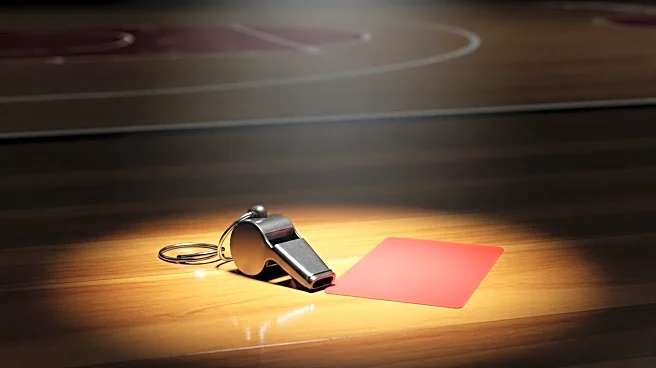What's Happening?
Cheryl Reeve, coach of the Minnesota Lynx, expressed strong dissatisfaction with the officiating during the team's 84-76 loss to the Phoenix Mercury in Game 3 of the WNBA playoff semifinals. Reeve was ejected after receiving her second technical foul in the final minute of the game. The incident that triggered her reaction was a play where Alyssa Thomas of the Mercury stole the ball from Lynx player Napheesa Collier, leading to a game-sealing layup. Collier, a five-time All-Star, injured her leg during the play and was assisted off the court. Reeve suggested that Collier might have a fracture but did not provide further details. The coach criticized the physicality allowed in the game, which she believes leads to injuries and conflicts. Reeve called for changes in WNBA officiating, particularly targeting the three officials present during the game.
Why It's Important?
The incident highlights ongoing concerns about officiating standards in the WNBA, which could impact player safety and the integrity of the game. Reeve's comments bring attention to the need for potential reforms in how games are officiated, especially during high-stakes playoff matches. The injury to Napheesa Collier, a key player for the Lynx, could significantly affect the team's performance in the remainder of the series. The situation underscores the broader issue of balancing competitive play with player safety, a topic of interest to players, coaches, and league officials alike.
What's Next?
The Lynx face a critical Game 4 against the Mercury, with the series at 2-1 in favor of Phoenix. The potential absence of Collier due to injury could be a major setback for Minnesota. Reeve's call for changes in officiating may prompt discussions within the WNBA about improving referee training and game management. The league might also consider reviewing the physicality allowed in games to prevent further injuries. Stakeholders, including team management and league officials, will likely monitor the situation closely.
Beyond the Headlines
Reeve's outspoken criticism of the officiating crew raises questions about accountability and transparency in sports officiating. It may lead to broader discussions about the role of referees and the criteria used to select them for important games. The incident also touches on the cultural aspect of sportsmanship and the expectations placed on players and coaches to maintain composure under pressure.











